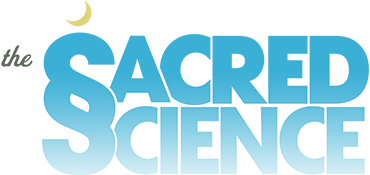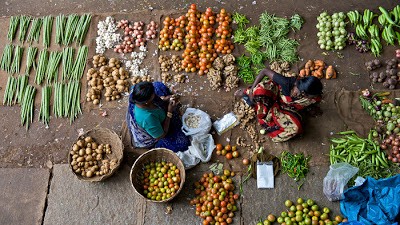What do you feel when you bite into a piece of dark chocolate? Does your palate explode in ecstasy? Do memories of warm holiday evenings and the scent of your mother’s kitchen wash through your body?
We naturally and easily associate foods with the environment in which we consume them and the people who share those foods with us, but all too often we’re disconnected from their origins. We might be shocked when we read articles about school children thinking milk comes from supermarkets, or trying to eat oranges without peeling them. But do we know where some of our more exotic foods come from, or the sacred mythology that underpins them?
A Delicious History
Every natural food has a biological and a sacred origin. The biological origin carries the evolutionary history and imprint of that food: where it developed and how it evolved in concert with its natural environment. The sacred origin informs our relationship with it: how we first discovered it, how we prepare and eat it, how the food interacts with our body, and the meaning and value it carries for us and our culture. Ask any indigenous person to tell you the sacred stories of their foods, and they will keep you listening for hours. Ask the modern “Westerner” and you are likely to receive a quizzical look.
Cacao, the bean from which chocolate is created, is a wonderful example of a food we all know and love, and yet are hard-pressed to explain its biological and sacred origins. For example, the flowers grow right off the trunk of cacao trees, and are pollinated not by bees or hummingbirds but by a tiny midge called Forcipomyia argenteola that thrives in the rotting leaf litter below the tree. A great reason not to clean up your cacao grove!
People in the cacao-producing regions of Mesoamerica considered the Cacao Tree to be the World Tree, not the ceiba tree that looms high above it. In fact, cacao was so sacred to the Maya and other Mesoamerican peoples that they only allowed their royalty to partake of it. They used it for important official and spiritual ceremonies including the coming-of-age celebrations of their children—and for currency. Cacao was more valuable than gold.
But we don’t have to become scholars to re-immerse ourselves in the sacredness of our food. Just as a thin layer of surface tension separates the vast depths of the ocean from the atmosphere, so an extraordinary world of flavor, history, and healing opens up to you with that very first intention—the intention to reconnect.
Slow Down & Enjoy Each Morsel
The first step is simple: step out of the rat race, even if for just a few minutes. Spend quality time with your food as you would with a loved one. Don’t eat at your desk while working on a report, don’t wolf down that egg frittata in your car on your way to work, and please don’t substitute coffee for breakfast. I’ve talked a lot about sacred time in my work—and it applies especially to our food. Sacred things deserve sacred time.
If you do nothing else, taking the time to savor the food you eat—and eating natural as opposed to process foods of course—will do wonders for your body and your psyche.
You Are What You Eat
Our intuition doesn’t lie, either. Do you feel heavy after a burger with fries washed down with soda, or pasta drenched in cream sauce, as if you had a boulder sitting in your stomach? Do you feel light and energized after a veggie-nut salad or grilled fish with saffron rice? Your body is trying to tell you something. Listen to it. Take the time to feel how you respond to specific foods. Every body is different—some of us love a lot of spice in our dishes, some of us would rather not thank you. Some of us are vegetarian, while some of us appreciate fish, poultry, and meat. Some of us have a naturally high metabolic rate, while others’ rhythms take their time.
Even Western science is now discovering that the source of most of our illnesses, whether physical, psychological, or yes, even mental, may lie in the gut. This is the place where our body, together with all of our communities of beneficial bacteria, embraces the food we introduce and runs it through a wondrous process of metamorphosis, fusing nature’s biology with ours.
Best of all, you don’t have to wait until you have a life-threatening condition to change your diet or connect to the sacred in you through the foods you eat. You can co-learn and co-experience—in other words, benefit from the experiences and journeys of others.
If having a deeper connection to your food resonates with you, I strongly recommend watching two extraordinary documentaries, screening online for free later this month. The first is Origins, about reconnecting to our roots. The second is Hungry for Change, about our relationship with food. Click below to check them out!
www.thesacredscience.com/free-documentaries
And if you listen between the lines, as it were, you’ll hear the sacred origins of the natural world calling you back. The closest and most immediate lifeline to that world is sitting on your plate.
Birgitte
Birgitte Rasine is the producer of the Mayan Calendar Portal and the author of the upcoming “The Jaguar and the Cacao Tree,” a novel for younger readers about the history and mythology of cacao. You can learn more about her at www.birgitterasine.com



6 Responses
Blessings Birgitte, and thank you for these important reminders, especially about the sacredness inherent in all our food.
Bight Blessings ~ Karen
can I be put on your email list
I enjoyed reading this article and we can all benefit from the different topics share on this site.
Thank you and many blessings!
Ana
Lovely article. I have clicked the link to find that the documentary page is FMTV and Origins is not available. It is also a subscribed page with only a ten day free trial, Billed after that.
Is there somewhere else I can view the movie for free pls?
Love x
I see that the africans have diferent kind of fruit en potatoes and more. I see so much colors. So if they cook, the food have diferent tast too. God bless there foods and bless you.
Let food be thy medicine and medicine be thy food, great posting reminder during this busy Christmas time when there seems so little of it for self-care. Thank you and Cheers.